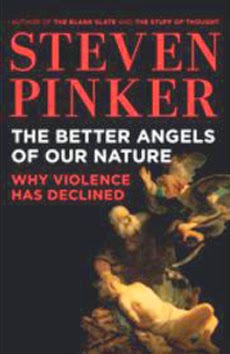From Whence Come Our "Better Angels"
Mature, public conversation about issues that matter is foundational for democratic society. I am delighted that Mark Zuckerberg's "A Year of Books" offers such an opportunity. To contribute to that dialog, I will offer commentary on each of the readings proposed by Zuckerberg.
The second title in Zuckerberg's list is The Better Angels of Our Nature: Why Violence Has Declined by Steven Pinker. Pinker, a regular guest on the "Colbert Report" with appearances in 2007, 2009, 2011, and 2013, is a Canadian-born professor at Harvard University. Pinker's work examines research and theories from many fields. He is described as an experimental psychologist, a cognitive scientist, and a linguist.
The Better Angels of Our Nature, with its index, comes in at just over 800 pages. To carry interest over such an expanse, Pinker excels as a witty, engaging author. Pinker describes six trends in declining violence, five inner demons, and four "better angels," a term taken from Abraham Lincoln's second inaugural address. Rather than undertake a detailed description of the book's argument, Wikipedia has a pretty good summary of the book here.
 The central thesis that gives birth to the book is that, despite our sense that the violence around us is escalating, human society has known a general, steady decline of violence over the centuries. Pinker's data sets are fascinating and, it seems, undeniable that, by percentage, fewer lose our lives to violence than the generations previous to us. While it seems counter to our experience, we live amid a long term trend away from violence. Next, he aims to describe why that decline has happened, via the "inner demons" and "better angels." His rich, detailed argument draws from great stories, political philosophy, sociology, history, medicine, and psychology. I frequently referred to his endnotes to see the array of source material that he drew upon.
The central thesis that gives birth to the book is that, despite our sense that the violence around us is escalating, human society has known a general, steady decline of violence over the centuries. Pinker's data sets are fascinating and, it seems, undeniable that, by percentage, fewer lose our lives to violence than the generations previous to us. While it seems counter to our experience, we live amid a long term trend away from violence. Next, he aims to describe why that decline has happened, via the "inner demons" and "better angels." His rich, detailed argument draws from great stories, political philosophy, sociology, history, medicine, and psychology. I frequently referred to his endnotes to see the array of source material that he drew upon.
Abounding in wit, I laughed regularly alongside Pinker's text. I particularly enjoyed his description of how the correct use of the knife at table, and the development of table manners, topics from Norbert Elias's classic, The Civilizing Process (1939), contribute to the reduction of violence (pp. 59-128). These 800 pages actually were quite enjoyable to read.
While I find thought-provoking the array of sources at his disposal and share his gratitude for the decline in violence from which we benefit, I do not share his conclusions for the cause of the decline. Ross Douthat, a blogger from for the New York Times, briefly describes the principal arguments against the case for Pinker's "better angels", and I concur with Douthat's criticisms.
I'd like to draw a bit more attention to Pinker's self-described "irreverent" voice (p. 696), especially in his treatment of faith. Pinker draws together many strands for the decline of violence. He sees capitalism and globalization as one source of a reduction in violence. He quips:
Faith is a much more complex matter than Pinker acknowledges. Yes, ISIS and Al Qaeda use violence in the name of faith. Yes, the Crusades and the Inquisition were horrible events perpetrated in the name of faith. And, yet, that only tells some of the story. Today, many of the most committed people to removing violence from society are people of faith. If you visit Ferguson, MO, or Baltimore, MD, or any of this country's poorest neighborhoods, you won't find Enlightenment philosophers, but you will find, amid all the poverty, churches. Even when everyone else leaves a neighborhood, the churches will remain so long as there are people. Look at so many places around the globe where violence is directed against people of faith, and still they witness to peace and nonviolence: Maximilian Kolbe, Dietrich Bonhoeffer, Franz Jägerstätter, Mahatma Gandhi, Martin Luther King, Jr., and Oscar Romero, to name but a few.
The lone "angel" excluded from Pinker's notion of "our better angels" is faith. Pinker belittles his thesis with his treatment of people of faith. While it may not fit his contrivance, people of faith have worked and have given their lives for a more peaceable world.
The second title in Zuckerberg's list is The Better Angels of Our Nature: Why Violence Has Declined by Steven Pinker. Pinker, a regular guest on the "Colbert Report" with appearances in 2007, 2009, 2011, and 2013, is a Canadian-born professor at Harvard University. Pinker's work examines research and theories from many fields. He is described as an experimental psychologist, a cognitive scientist, and a linguist.
The Better Angels of Our Nature, with its index, comes in at just over 800 pages. To carry interest over such an expanse, Pinker excels as a witty, engaging author. Pinker describes six trends in declining violence, five inner demons, and four "better angels," a term taken from Abraham Lincoln's second inaugural address. Rather than undertake a detailed description of the book's argument, Wikipedia has a pretty good summary of the book here.
 The central thesis that gives birth to the book is that, despite our sense that the violence around us is escalating, human society has known a general, steady decline of violence over the centuries. Pinker's data sets are fascinating and, it seems, undeniable that, by percentage, fewer lose our lives to violence than the generations previous to us. While it seems counter to our experience, we live amid a long term trend away from violence. Next, he aims to describe why that decline has happened, via the "inner demons" and "better angels." His rich, detailed argument draws from great stories, political philosophy, sociology, history, medicine, and psychology. I frequently referred to his endnotes to see the array of source material that he drew upon.
The central thesis that gives birth to the book is that, despite our sense that the violence around us is escalating, human society has known a general, steady decline of violence over the centuries. Pinker's data sets are fascinating and, it seems, undeniable that, by percentage, fewer lose our lives to violence than the generations previous to us. While it seems counter to our experience, we live amid a long term trend away from violence. Next, he aims to describe why that decline has happened, via the "inner demons" and "better angels." His rich, detailed argument draws from great stories, political philosophy, sociology, history, medicine, and psychology. I frequently referred to his endnotes to see the array of source material that he drew upon.Abounding in wit, I laughed regularly alongside Pinker's text. I particularly enjoyed his description of how the correct use of the knife at table, and the development of table manners, topics from Norbert Elias's classic, The Civilizing Process (1939), contribute to the reduction of violence (pp. 59-128). These 800 pages actually were quite enjoyable to read.
While I find thought-provoking the array of sources at his disposal and share his gratitude for the decline in violence from which we benefit, I do not share his conclusions for the cause of the decline. Ross Douthat, a blogger from for the New York Times, briefly describes the principal arguments against the case for Pinker's "better angels", and I concur with Douthat's criticisms.
I'd like to draw a bit more attention to Pinker's self-described "irreverent" voice (p. 696), especially in his treatment of faith. Pinker draws together many strands for the decline of violence. He sees capitalism and globalization as one source of a reduction in violence. He quips:
Cultural and intellectual elites have always felt superior to businesspeople, and it doesn't occur to them to credit mere merchants with something as noble as peace. (p. 684)Pinker forgives democracy's toleration of slavery as "the 1.0 release of a complex new technology," praising its "upgradability" (p. 161). Pinker will absolve the Enlightenment of responsibility for the French Revolution, the Reign of Terror, and Napoleon, as the revolutionaries drew their inspiration from "intellectual lightweights," not those streams of thinking he prefers (p. 184). At the same time, Pinker, a cultural and intellectual elite, refuses to credit religion with any role in the reduction of violence. Pinker ascribes "the seeds of a movement" away from war to satirists and Immanuel Kant, without acknowledging St. Augustine or St. Thomas Aquinas (p. 167). Pinker describes the work of Martin Luther King, Jr. without acknowledging that his primary role was as pastor (pp. 479-481). While he acknowledges repeatedly the contributions of many people to the streams of thought that he applauds, more than a few of whom were in fact deeply religious people, including some clergy, Pinker creates a straw man argument against religion.
Faith is a much more complex matter than Pinker acknowledges. Yes, ISIS and Al Qaeda use violence in the name of faith. Yes, the Crusades and the Inquisition were horrible events perpetrated in the name of faith. And, yet, that only tells some of the story. Today, many of the most committed people to removing violence from society are people of faith. If you visit Ferguson, MO, or Baltimore, MD, or any of this country's poorest neighborhoods, you won't find Enlightenment philosophers, but you will find, amid all the poverty, churches. Even when everyone else leaves a neighborhood, the churches will remain so long as there are people. Look at so many places around the globe where violence is directed against people of faith, and still they witness to peace and nonviolence: Maximilian Kolbe, Dietrich Bonhoeffer, Franz Jägerstätter, Mahatma Gandhi, Martin Luther King, Jr., and Oscar Romero, to name but a few.
The lone "angel" excluded from Pinker's notion of "our better angels" is faith. Pinker belittles his thesis with his treatment of people of faith. While it may not fit his contrivance, people of faith have worked and have given their lives for a more peaceable world.




Comments
Post a Comment